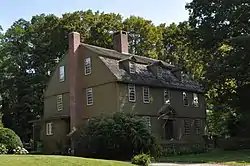Jabez Bacon House
The Jabez Bacon House is a historic house on Hollow Road in Woodbury, Connecticut. Built in 1760 for a prominent regional merchant, it is a well-preserved example of Georgian architecture. It was listed on the National Register of Historic Places in 1971.[1]
Jabez Bacon House | |
 | |
  | |
| Location | Hollow Rd. near jct. with U.S. 6, Woodbury, Connecticut |
|---|---|
| Coordinates | 41°32′17″N 73°12′32″W |
| Area | 3 acres (1.2 ha) |
| Built | 1760 |
| Built by | Moore, Roswell |
| Architectural style | Georgian |
| Part of | Woodbury Historic District No. 1 (ID71000908) |
| NRHP reference No. | 71000904[1] |
| Significant dates | |
| Added to NRHP | April 16, 1971 |
| Designated CP | March 11, 1971 |
Description and history
The Jabez Bacon House stands near the southern end of Woodbury's main village, on the north side of Hollow Road between Sycamore and Main Streets. It is a 2+3⁄4-story wood-frame structure, with a dormered gambrel roof, central chimney, and clapboarded exterior. It is five bays wide, with a slightly overhanging second story. The front entry is centered, with a reproduction surround consisting of flanking pilasters and a pedimented gable above. The three roof dormers also exhibit full pediments. The interior of the house follows a typical Georgian central chimney plan, but has a wider than usual entry vestibule with staircase. The interior retains original paneled wall finishes, and many rooms have original flooring. The living room includes a period cabinet, and the chimney includes two surviving period ovens.[2]
The house was built in 1760 by Roswell Moore, a prominent local carpenter. He built it for Jabez Bacon, a merchant and banker who operated a store next door, and sent traders as far west as present-day Ohio. It was later acquired by Daniel Curtiss, who also operated a merchant business. Curtiss notably trained as a salesman Collis Potter Huntington, who later became prominent for his role in construction of the transcontinental railway.[2]
See also
- Glebe House (Woodbury, Connecticut), a house museum nearby on Hollow Road
- National Register of Historic Places listings in Litchfield County, Connecticut
References
- "National Register Information System". National Register of Historic Places. National Park Service. July 9, 2010.
- Luyster, Constance (1970). "NRHP nomination for Jabez Bacon House". National Park Service. and Accompanying photo from 1970